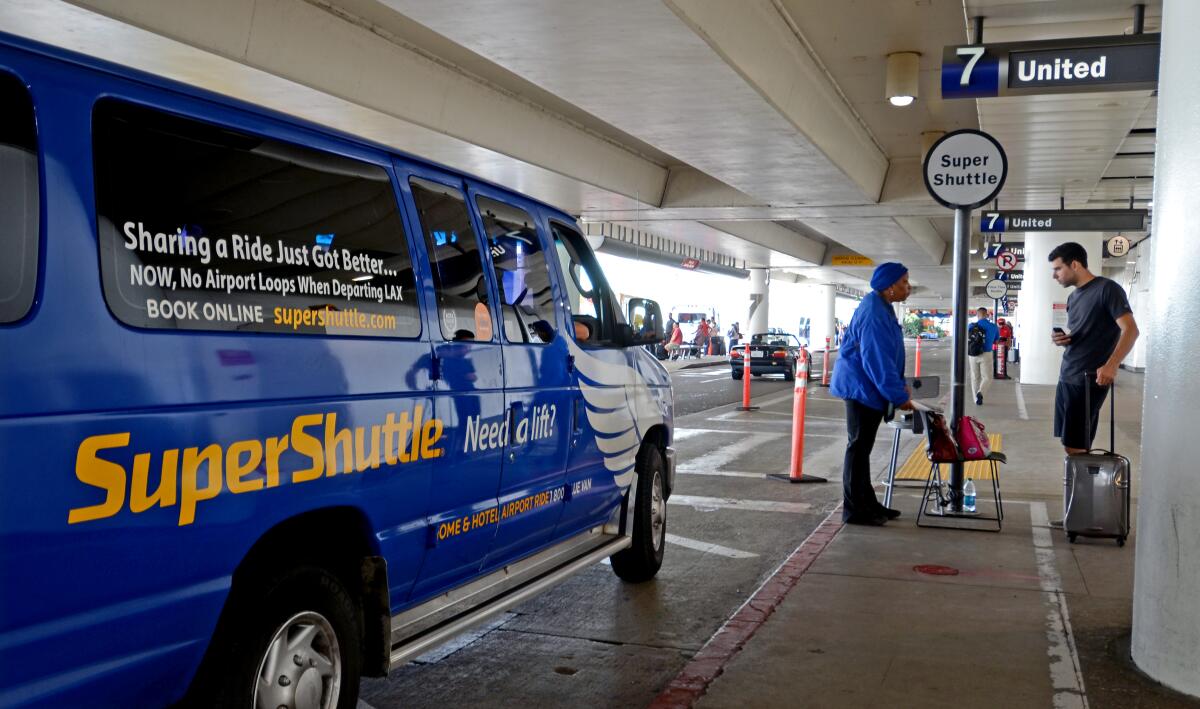SuperShuttle is going out of business. Its last rides are Dec. 31

SuperShuttle, the shared van ride that has served passengers heading to and from airports around the world, including Los Angeles International Airport, will cease operations at the end of the year.
The company â which was founded in 1983 to serve LAX and expanded nationwide as well as to Latin America, Canada, Europe and Asia â has been plagued by competition from Uber and Lyft. In recent weeks it has pulled out of airports serving many cities, including Burbank, Sacramento, Phoenix, Baltimore and Minneapolis.
A Tuesday letter from the company to a Los Angeles-area franchisee, obtained by The Times, says: âSuperShuttle plans to honor all reservations and walk-up requests for serviceâ through Dec. 31.
Attempts to reach Mark Friedman, identified as general manager in the letterâs signature line, were unsuccessful Thursday. SuperShuttle executives could not be reached for official comment. But two SuperShuttle reservations agents reached by telephone confirmed that the company was going out of business, as did a company executive who was not authorized to speak publicly.
SuperShuttle is one of the few services that can still pick up riders curbside at LAX after the airportâs recent changes to help ease congestion. In November, Lyft, Uber and taxis were relegated to a pickup lot next to Terminal 1; travelers can either walk there or wait for an airport shuttle to ferry them.
But shared van services such as SuperShuttle have been hit hard since the advent of ride-hailing services. At LAX, shared van rides plunged by two-thirds in the first half of this year compared with the first half of 2016, the first full year that Uber and Lyft operated there, according to city data. Trips on LAXâs FlyAway buses also sank by two-thirds during that time; taxi trips fell 39%; and courtesy shuttles to car rental facilities, parking lots and hotels saw a 20% decline. The number of Uber and Lyft trips, meanwhile, more than doubled.
Getting to LAX is rarely easy. With four heavy bags, it can be really tough. Here are some different choices.
The letter to the franchisee cited âa variety of factorsâ for the companyâs closure, âincluding increasing costs and changes in the competitive and regulatory landscapeâ that âhave called into question the economic and operational viability of the companyâs operations.â
The shutdown will leave franchisees in the lurch â hundreds of them in California alone.
âA lot of us own our vans, and now we donât have jobs,â Mohammad Baraei said Thursday afternoon in between shuttling people to and from LAX, adding that he still owes about half the payments on his $66,000 vehicle. âI canât even file for unemployment. I donât know what Iâm going to do.â
SuperShuttle is also laying off employees. Customer service representative Ricky Heredia, who is stationed at the airport to help travelers connect with their rides, said he learned about the shutdown shortly before his lunch break Thursday: His manager handed him a letter saying his job would end Dec. 31.
Merih Tuncay, waiting to be picked up at LAX on Thursday, said he has been a loyal SuperShuttle customer for the last five years as he splits his time between his homes in Turkey and Fontana. The 45-year-old said he has enjoyed reserving a ride in advance and knowing the price far ahead of time â benefits that Uber and Lyft donât provide.
Tuncay said that for rides between LAX and Fontana, he used to rely on a taxi driver heâd befriended â until that driverâs fare rose to $500 for a round trip. SuperShuttle charges him $286, he said. Asked what heâd do without SuperShuttle, Tuncay said: âMaybe Iâll have to start renting a car.â
Other travelers at the airport similarly said they appreciated SuperShuttleâs comparatively low prices and the fact that a large family plus luggage could fit into the van.
But the vansâ high capacity also can mean inconveniently long, winding trips as riders are dropped off one by one. âIn honor of the death of SuperShuttle, on your way home tonight make a random stop at 7 different addresses before finally heading home,â Twitter user @jehawks joked.
Signs of the companyâs shakiness appeared shortly before the Thanksgiving holidays: In addition to withdrawing from several other airports, SuperShuttle suspended its operations at LAX because of an issue with insurance. The California Public Utilities Commission said the service was out of compliance with state regulations. The issue was resolved Nov. 21.
SuperShuttle is owned by an affiliate of Blackstreet Capital Holdings, a private investment firm in Bethesda, Md., court documents show. Blackstreet describes itself as specializing in acquiring small or midsize companies âthat are in out-of-favor industries or are undergoing some form of transition.â
Blackstreet acquired SuperShuttle in September from Transdev on Demand Inc., which is part of the Transdev Group of France, according to a lawsuit Transdev filed against Blackstreet this month in Delaware Chancery Court in a dispute over some terms of the transaction.
Officials at Blackstreet could not immediately be reached for comment on SuperShuttleâs suspended services or on how SuperShuttleâs services are divided between company-owned operators and franchisees.
SuperShuttleâs website shows that the company provided service to more than 80 airports worldwide, including those in Southern California, before it began suspending services in many locations.
The companyâs demise comes less than a year after it won a labor victory that made it easier to classify its drivers as independent contractors rather than employees. In January, the National Labor Relations Board ruled against SuperShuttle drivers at Dallas-Fort Worth airport who were looking to unionize.
Times staff writers James F. Peltz and Laura J. Nelson contributed to this report.
More to Read
Sign up for The Wild
Weâll help you find the best places to hike, bike and run, as well as the perfect silent spots for meditation and yoga.
You may occasionally receive promotional content from the Los Angeles Times.









